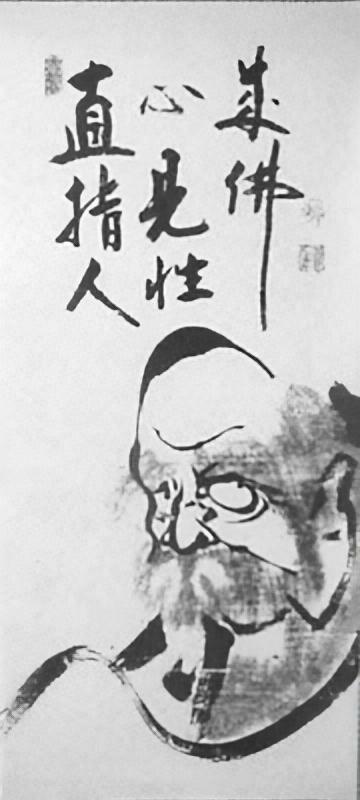Hakuin Ekaku
| Hakuin Ekaku | |
|---|---|

Scroll calligraphy by Hakuin Ekaku (depicts Bodhidharma). Caption: Jikishi ninshin, Kensho jobutsu: “Direct pointing at the mind of man, seeing one's nature and becoming Buddha.”
|
|
| School | Rinzai |
| Personal | |
| Born | c. 1686 Japan |
| Died | c. 1769 |
| Senior posting | |
| Title | Rōshi |
Hakuin Ekaku (白隠 慧鶴?, January 19, 1686 - January 18, 1768) was one of the most influential figures in Japanese Zen Buddhism. He is regarded as the reviver of the Rinzai school from a moribund period of stagnation, refocusing it on its traditionally rigorous training methods integrating meditation and koan practice.
Hakuin was born in 1686 in the small village of Hara, at the foot of Mount Fuji. His mother was a devout Nichiren Buddhist, and it is likely that her piety was a major influence on his decision to become a Buddhist monk. As a child, Hakuin attended a lecture by a Nichiren monk on the topic of the Eight Hot Hells. This deeply impressed the young Hakuin, and he developed a pressing fear of hell, seeking a way to escape it. He eventually came to the conclusion that it would be necessary to become a monk.
At the age of fifteen, he obtained consent from his parents to join the monastic life, and was ordained at the local Zen temple, Shōin-ji. When the head monk at Shōin-ji took ill, Hakuin was sent to a neighboring temple, Daishō-ji, where he served as a novice for three or four years, studying Buddhist texts. While at Daisho-ji, he read the Lotus Sutra, considered by the Nichiren sect to be the king of all Buddhist sutras, and found it disappointing, saying "it consisted of nothing more than simple tales about cause and effect".
At age eighteen, he left Daishō-ji for Zensō-ji, a temple close to Hara. At the age of nineteen, he came across in his studies the story of the Chinese Ch'an master Yantou Quanhuo, who had been brutally murdered by bandits. Hakuin despaired over this story, as it showed that even a great monk could not be saved from a bloody death in this life. How then could he, just a simple monk, hope to be saved from the tortures of hell in the next life? He gave up his goal of becoming an enlightened monk, and not wanting to return home in shame, traveled around studying literature and poetry.
...
Wikipedia
